The dream of becoming a great musician seemed impossible now for Noah. He might never make it. He knew that. But he was not willing to give up.
He had been in the school orchestra for three years and played the violin well enough, but he wanted more than that. He wanted to play with the symphony or on television. And he wanted to be better than average. His parents were proud of him, but he wanted to do more so they could be more proud.
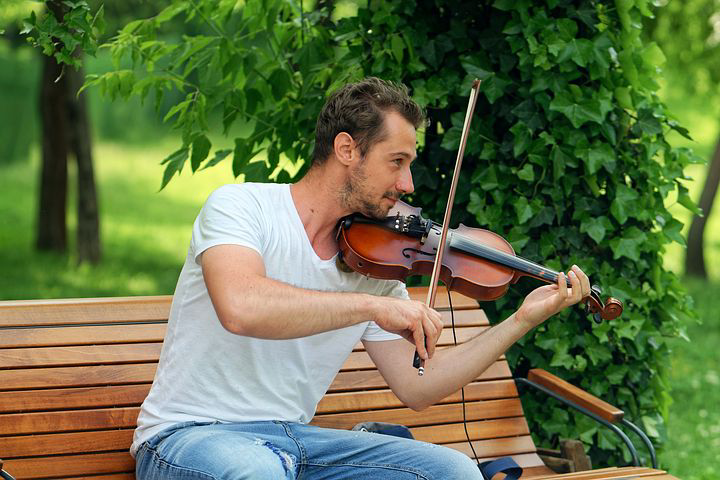
Source
"I'm going to be a concert pianist," Noah told his mother one night after dinner. "Or maybe I'll be an opera singer."
His father laughed. "You're just like your grandfather," he said. "He always thought he was destined for greatness. If you can't get into Juilliard, you should try out for the Boston Pops."
Noah's grandfather died when Noah was five years old. Noah didn't remember much about him except that he had been very good at playing the piano. And he had loved music.
"What are you talking about?" his mother asked. She put down her fork and stared at him as if she'd never seen him before. "Where did this come from? You don't even want to be in the orchestra anymore."
"Of course I do," Noah protested.
"But I think I can do better. I've got to reach for something else."
"Why? Why do you have to leave us?" she demanded. Her eyes filled with tears. "We love you, Noah. We need you here."
She had been crying all evening, but he hadn't known why until then. Tears rolled down his cheeks too. "I know," he murmured. "I miss you, Mom. But I can't help it. I have to go somewhere where I can really become a musician."
She reached across the table and took his hand. She squeezed it hard. "I'm so sorry," she whispered.
He nodded. He understood. They both knew he had to follow his path, no matter how difficult it was.
It wasn't easy for him to tell them goodbye. He felt guilty and selfish leaving them behind. But he couldn't explain any of this to them. It was too complicated. The truth was that he really wanted to make waves in the industry.

When it was time to leave, he went first to his room and packed everything he owned into two suitcases: clothes, books, CDs, a few musical instruments, and a handful of personal mementos. Then he went downstairs to say goodbye to his parents.
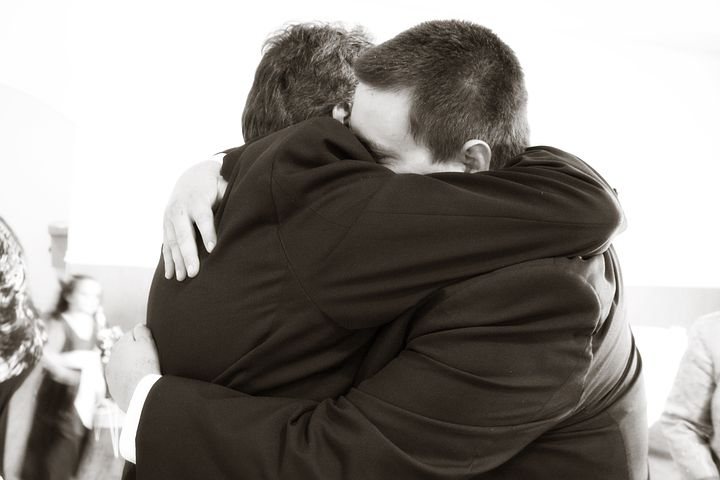
Source
They hugged him tightly. His mother cried harder than ever. His father tried to smile, but he looked sad instead. Noah wished he could stay longer. He wanted to apologize again for leaving them. But he knew there was nothing he could say to make it right.
"If you're going to Juilliard, you'll be gone for months," his mother said, sniffling. "And you'll call every week."
"Sure," Noah replied. He knew she was trying to cheer him up, but he couldn't stop thinking about what he was doing.
He was going to Juilliard. He was going to the best place in the world to learn to play the violin. And he was going to be famous. He would become the next Yehudi Menuhin or Joshua Bell or Yo-Yo Ma.
He didn't say any of this to his parents, though. He just smiled back at them and promised he'd call every week. Then he kissed them both on the cheek and walked out the door.

The bus dropped Noah off at the train station. He bought a ticket to New York City and boarded the subway. When he arrived, he lugged his suitcases onto the platform and found a taxi. The driver gave him directions to Juilliard.
The school was located on West Fifty-sixth Street, between Broadway and Fifth Avenue. It was housed in a huge gray stone building, surrounded by high walls and trees. The main entrance was a large archway topped with a statue of Apollo. A brass plaque on the wall read JUILLIARD COLLEGE OF MUSIC.
As Noah approached the front steps, he saw a line of students waiting to enter. Some of them wore black gowns and carried their music cases. Others were dressed casually. One boy was wearing jeans and a T-shirt, with a guitar slung over his shoulder. Noah stopped to watch him for a moment. He was short and skinny, with long blond hair and bright blue eyes. He had the look of someone who was completely comfortable in his skin. Noah envied him.
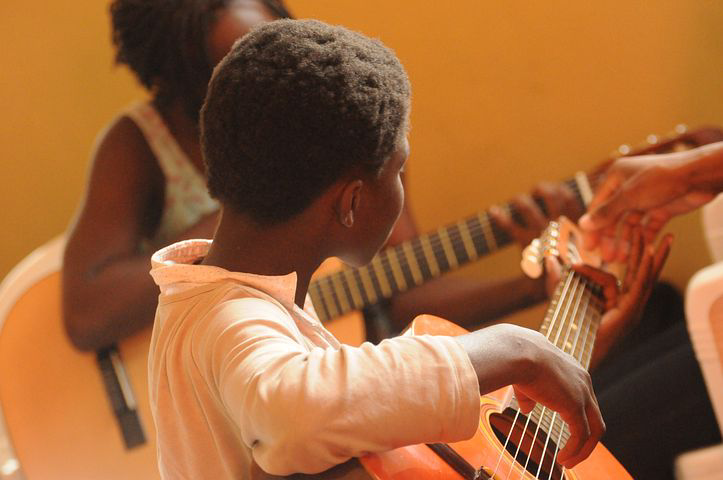
Source
He had never imagined himself standing here. But he had dreamed of Juilliard since he was five years old. He was determined to get inside.
The line moved forward. Noah joined it.
"Name?" a woman in uniform asked.
"Noah Blake," he answered. "From California."
"ID?"
Noah handed her his driver's license.
"You're late," she said, glancing at her watch. "You missed the entrance ceremony. Everyone will be gone by now."
"Sorry," Noah said. "I got held up."
She studied his face. "I don't recognize you. Are you new?"
"Yes. I'm supposed to audition for admission into Julliard."
"Then you'll have plenty of time to get settled in," she said. "Go on inside. Your name will be called."
"Thanks." Noah started up the stairs.
The hallways were wide and dimly lit. The air smelled of dust and dampness. There were portraits of composers hanging on the walls and hundreds of photographs of famous musicians.
Noah made his way to the administrative offices. An assistant was sitting behind a desk. He showed her his ID card and explained that he had been invited to audition for the school. She gave him a small packet of papers to fill out and said that he would be notified if he had been accepted.
Noah signed the forms and thanked her. He waited outside for several minutes, reading the names on the wall. They all sounded important. He wondered if he would meet any of them.

Finally, the assistant came out.
"Follow me," she said. "The audition is in Room A. This way."
She led him through the hallway and down a flight of stairs. The lower level was mostly empty, but Noah glimpsed a few people gathered around a piano.
They climbed another set of stairs and turned left. At last, they reached a door marked ROOM A. The assistant knocked once and opened it.
The room was dark and cluttered, with chairs and desks piled high with music scores and music stands. Noah saw a dozen other boys and girls sitting on the floor, hunched over their violins or cellos.
A man stood near the door. He was tall and thin, with graying hair and a white beard. He wore a rumpled tweed jacket and a pair of wire-rimmed glasses.
"I'm Mr. Dawes," he said. "I'll be conducting the audition today. Please take your seats."
Noah sat down on the floor. The others in the room did the same. Mr. Dawes stepped up to the front of the room and faced them. He cleared his throat. "This is the audition for the junior division," he announced.
"We're looking for candidates for the freshman class. I will ask each of you to play a short piece. You will play it twice, first alone, then together with another candidate. I will choose three students to join our program. You will be expected to attend classes regularly and perform as a group during the summer term. Anyone who does not make the cut may reaudition next year."
He paused. "Let's begin with the solo pieces. Who wants to go first?"
A boy with thick black hair raised his hand. "I will, sir."
"Good choice," Mr. Dawes said. "Go ahead."
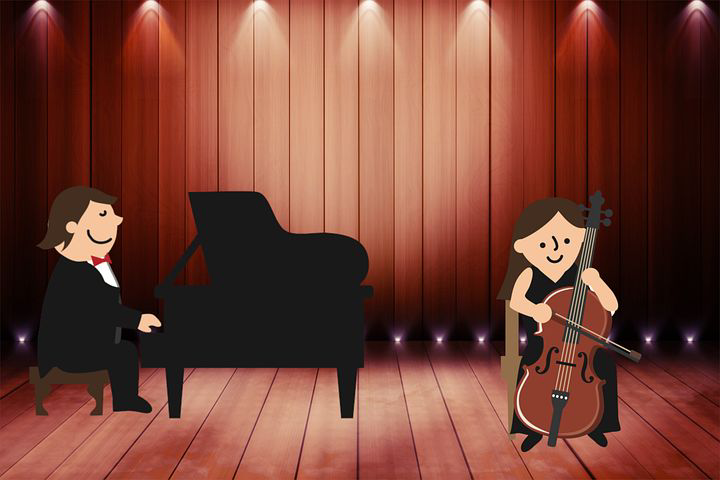
Source
The boy began to play Bach's Partita No. 1 in E Major. He played it well, showing good technique and control. Noah recognized it immediately. He had heard it many times before.
Mr. Dawes watched him closely. "Very good," he said. "Do you know the rest of the piece?"
"Yes, sir."
"Then let's move on to the second person. Who wants to go next?"
Another boy raised his hand. "I will."
"You're sure?" Mr. Dawes asked.
"Absolutely, sir. I've memorized the whole thing."
"Very good. Let's hear you play it."
The boy nodded and began to play. He was good, much better than the first boy. He was also much more confident. Noah could understand why he had been so brave and confident.
After the boy finished, Mr. Dawes said, "Excellent. All right, next."
A girl with curly red hair stood up. "I'd like to go next."
The first boy frowned. "Are you sure? I think—"
"Please, sir," she interrupted. "I'm ready."
Mr. Dawes glanced at her. "All right," he said. "Go ahead."
The girl began to play. She made a strong start, but the music grew boring quickly. Noah could see that she was losing interest. He knew the feeling well.
She stumbled over a couple of notes and almost fell asleep. The audience laughed nervously. She looked at her hands, embarrassed.
"Stop!" Mr. Dawes barked. "That's enough."
"Oh, yes," she said, dropping her bow. "Sorry, sir. I guess I was a little tired."
"Well, we can't have that," he replied. "We're looking for the most talented students. So I'm afraid you won't be joining us this year."
"But I've practiced for weeks," she protested. "I'm the best player here."
"I'm sorry," Mr. Dawes replied. "But the only way to be the best is to work hard at your studies."
"I'm serious," the girl insisted. "I'm the best at this school."
Mr. Dawes sighed. "I'm sure you are. But we don't have time for someone who isn't serious about her music."
"How do you know I'm not serious?" she asked. "You haven't even given me a chance."
"I've already decided," he said.
"Now leave."
She folded her arms and left angrily.

After the girl left, Mr. Dawes said, " All right, next."
Noah stood up. "I'd like to go next."
Mr. Dawes studied him carefully.
"What kind of music do you play?"
"Classical, sir," Noah replied.
"Violin and viola."
"Very good," Mr. Dawes said. "And what about your performance?"
Noah shrugged. "It was okay. I'm not very experienced."
"You seem young," Mr. Dawes observed. "Is that why you want to study with us?"
"Yes," Noah admitted. "I'm seventeen. Almost eighteen. I just graduated from high school."
"Have you been studying an instrument for long?"
Noah shook his head. "Not really. Just a few years. I started when I was five."
"Why did you decide to come here?"
"I heard about it in a magazine," Noah replied. "My father thought I should try something different." "My ambition is to be one of the best in music."
"And you think you can make it here?"
"I hope so."
"Very well," Mr. Dawes said. "Go ahead."
Noah picked up his violin and bowed to the audience. He took a deep breath and began to play. He hadn't been practicing his Bach very recently, but he still knew the first part by heart. The melody came easily to him.
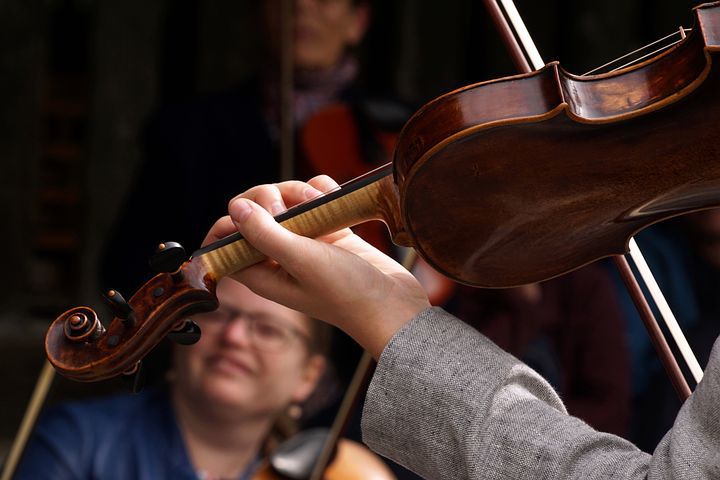
His playing was flawless.
The room fell silent. They could all hear the sweet sounds of the violin filling up the space around them. Noah kept going, playing the entire piece without a mistake.
When he finished, everyone applauded enthusiastically. For a moment, Noah forgot himself and looked around. They were all staring at him.
Someone whistled softly. Another clapped his hands. A girl jumped up and down, clapping her hands.
Noah felt his cheeks flush with embarrassment. How silly he had been! He couldn't believe how stupid he had acted. All these people wanted him to be a part of their group. His dream was coming true.
"Very good," Mr. Dawes said. "Very good indeed."
Noah bowed again and lowered his violin. He stood there, waiting for Mr. Dawes to speak.
The teacher seemed lost in thought.
Finally, he spoke. "You're very good, Noah," he said. "I have my doubts about whether you should join our program. It would be too difficult for someone with your skills to keep up.
But I think you should give it a try."
Noah stared at him in disbelief.
"Thank you," he whispered.
Mr. Dawes smiled. Then he walked over to the door and turned to face the students. "Next," he said.
Other students took the stage to display their talents. In the end, three good ones were chosen and Noah happened to be one of them. He jumped for joy when his name was called for he felt close to reaching his musical dreams.

